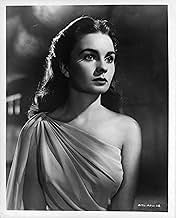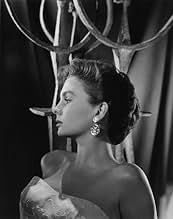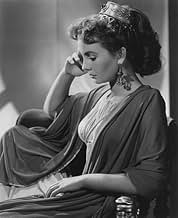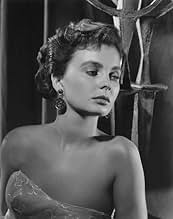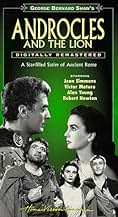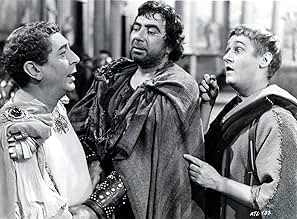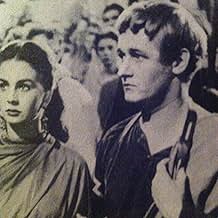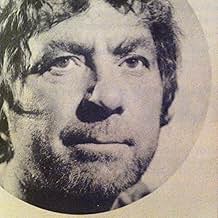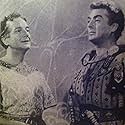AVALIAÇÃO DA IMDb
6,0/10
1,2 mil
SUA AVALIAÇÃO
Adicionar um enredo no seu idiomaStory of a Christian in ancient Rome who befriends a lion.Story of a Christian in ancient Rome who befriends a lion.Story of a Christian in ancient Rome who befriends a lion.
- Direção
- Roteiristas
- Artistas
Abdullah Abbas
- Gladiator
- (não creditado)
Doris Barton
- Vestal Virgin
- (não creditado)
Mary Bayless
- Christian
- (não creditado)
Chet Brandenburg
- Christian
- (não creditado)
Carol Brooks
- Vestal Virgin
- (não creditado)
- Direção
- Roteiristas
- Elenco e equipe completos
- Produção, bilheteria e muito mais no IMDbPro
Avaliações em destaque
"Androcles and the Lion" is a film adaptation of a 1912 play by George Bernard Shaw. The Irish playwright and author wrote in various mediums with humor and often biting social commentary. He was an avowed socialist and atheist. But, during much of his later life he expounded on a belief in an advanced state of society and being. He thought of it coming about by evolution.
This film and play is a whimsical version of a tale about an early Christian tailor who is taken prisoner and sent to Rome to be tortured and killed in the coliseum. Most people know the tale, so it doesn't come as a surprise. The humorous jabs at religion, history and government enliven the original tale. One might imagine that the play went over well with audiences in the early 20th century, yet Shaw's laborious prologues or narrations afterwards wore out audiences with his vaunting of socialism and lambasting of everything else. Much of Shaw's intent was to parody the early Christian persecution with the treatment by the British government of the common folk of his day. He says so directly in his Afterword to the play. That was Shaw's vehicle to get on his soapbox for socialism.
But, by the mid-20th century, the allure of socialism was fast fading. And, with the memories of war with heathen enemies still fresh, the spoofing of Christianity had lost its appeal. The film flopped at the box office. Many decades later, just some of the script retains its humor, and the film seems slow and quite dated.
The spoofery of early Christianity in the pagan Roman Empire is apparent at the start. As the captives are being marched off to Rome, they sing "Onward Christian Soldiers." The popular English hymn was written and composed in the late 19th century. The early 20th century audiences of Shaw's play would have known that.
The film has a cast of prominent Hollywood and English actors of the time. A couple of other reviewers give some history about the film delays and cast changes after shooting began. So, Rex Harrison, Dana Andrews, George Sanders and Harpo Marx aren't in the film. Victor Mature is a Roman captain in charge of the Christian prisoners. He is attracted to one of the very joyful (and beautiful) Christians, Lavinia, played by Jean Simmons. Can anyone possibly guess how that might turn out?
Elsa Lanchester, Reginald Gardiner, Gene Lockhart, Alan Mowbray, Jim Backus and Strother Martin are some more of the well-known actors of the day. But the person who steals the show and every scene he is in is Robert Newton as Ferrovius. His role and performance are the bulk of the humor in this film. It's solely for his performance that I give this film six stars. His humor of restraint is very funny, while his lines also convey an accurate quality of the early martyrs that people have admired over the centuries. One wonders if Shaw realized that he was as much honoring the early martyrs as he was poking fun at their cause.
Here are some favorite lines from the film.
Spintho, "Christianity is very contagious, captain. You never can tell where it will strike next. We want to be certain that it does not strike our valiant soldiers... and their officers."
Spintho, "The enemy within is just as dangerous as the enemy without, captain."
Spintho, "Her name is Lavinia. I envy the lion." Captain, "Which lion?" Spintho, "The one that will eat her."
Lavinia, "If I don't behave, I shall be thrown to the lions. And if I do behave I shall be thrown to the lions, just the same. Is that what you mean?"
Centurion, "Now, remember that you're a Christian. You gotta return good for evil."
Androcles, "Easy, Ferrovius, easy. You broke the last man's jaw." Ferrovius, "Yes, but I saved his soul. What matters a broken jaw?"
Androcles, "Let him go, brother. Our religion forbids you to strike him." Ferrovious, "On the contrary, it commands me to strike him. How could he turn the other cheek if he's not first struck on one cheek?"
Editor of the Gladiators, "Caesar will go down in history as the emperor who eliminated these cranks. Hail Caesar!" Emperor Antoninus (Caesar), "On the contrary. I'm more likely to be remembered as the man who did more to perpetuate them." Editor of Gladiators, "You, Caesar?" Emperor Antoninus, "I dare say I am doing more to spread Christianity than all their preachers, missionaries and Gospel writers put together. I shouldn't be surprised if finally I wind up as one of their heroes." Editor of Gladiators, "Caesar jests of course." Emperor Antoninus, "Caesar does not jest. I wager that for every Christian that dies in the bloody sand, two new ones leave the coliseum." Editor of Gladiators, "Perhaps then, Caesar should change his tactics." Emperor Antoninus, "Impossible. I am a subject of history and I must submit to its inevitable course. It is my destiny to fan the fires of Christianity by offering them martyrdom in the arena."
Androcles, "The coliseum! I never thought I'd live to see it."
Emperor Antoninus, "Metellus, you see now the disadvantages of two much severity. These people have no hope, therefore there's nothing to restrain them from saying whatever they like to. They're almost as important as the gladiators."
Ferrovius, "I will not fight. I will die. Better to stand with the archangels than with the Praetorian Guard." Emperor Antoninus, "I cannot believe that the archangels, whoever they may be, would not prefer to be recruited form the Praetorian Guard."
This film and play is a whimsical version of a tale about an early Christian tailor who is taken prisoner and sent to Rome to be tortured and killed in the coliseum. Most people know the tale, so it doesn't come as a surprise. The humorous jabs at religion, history and government enliven the original tale. One might imagine that the play went over well with audiences in the early 20th century, yet Shaw's laborious prologues or narrations afterwards wore out audiences with his vaunting of socialism and lambasting of everything else. Much of Shaw's intent was to parody the early Christian persecution with the treatment by the British government of the common folk of his day. He says so directly in his Afterword to the play. That was Shaw's vehicle to get on his soapbox for socialism.
But, by the mid-20th century, the allure of socialism was fast fading. And, with the memories of war with heathen enemies still fresh, the spoofing of Christianity had lost its appeal. The film flopped at the box office. Many decades later, just some of the script retains its humor, and the film seems slow and quite dated.
The spoofery of early Christianity in the pagan Roman Empire is apparent at the start. As the captives are being marched off to Rome, they sing "Onward Christian Soldiers." The popular English hymn was written and composed in the late 19th century. The early 20th century audiences of Shaw's play would have known that.
The film has a cast of prominent Hollywood and English actors of the time. A couple of other reviewers give some history about the film delays and cast changes after shooting began. So, Rex Harrison, Dana Andrews, George Sanders and Harpo Marx aren't in the film. Victor Mature is a Roman captain in charge of the Christian prisoners. He is attracted to one of the very joyful (and beautiful) Christians, Lavinia, played by Jean Simmons. Can anyone possibly guess how that might turn out?
Elsa Lanchester, Reginald Gardiner, Gene Lockhart, Alan Mowbray, Jim Backus and Strother Martin are some more of the well-known actors of the day. But the person who steals the show and every scene he is in is Robert Newton as Ferrovius. His role and performance are the bulk of the humor in this film. It's solely for his performance that I give this film six stars. His humor of restraint is very funny, while his lines also convey an accurate quality of the early martyrs that people have admired over the centuries. One wonders if Shaw realized that he was as much honoring the early martyrs as he was poking fun at their cause.
Here are some favorite lines from the film.
Spintho, "Christianity is very contagious, captain. You never can tell where it will strike next. We want to be certain that it does not strike our valiant soldiers... and their officers."
Spintho, "The enemy within is just as dangerous as the enemy without, captain."
Spintho, "Her name is Lavinia. I envy the lion." Captain, "Which lion?" Spintho, "The one that will eat her."
Lavinia, "If I don't behave, I shall be thrown to the lions. And if I do behave I shall be thrown to the lions, just the same. Is that what you mean?"
Centurion, "Now, remember that you're a Christian. You gotta return good for evil."
Androcles, "Easy, Ferrovius, easy. You broke the last man's jaw." Ferrovius, "Yes, but I saved his soul. What matters a broken jaw?"
Androcles, "Let him go, brother. Our religion forbids you to strike him." Ferrovious, "On the contrary, it commands me to strike him. How could he turn the other cheek if he's not first struck on one cheek?"
Editor of the Gladiators, "Caesar will go down in history as the emperor who eliminated these cranks. Hail Caesar!" Emperor Antoninus (Caesar), "On the contrary. I'm more likely to be remembered as the man who did more to perpetuate them." Editor of Gladiators, "You, Caesar?" Emperor Antoninus, "I dare say I am doing more to spread Christianity than all their preachers, missionaries and Gospel writers put together. I shouldn't be surprised if finally I wind up as one of their heroes." Editor of Gladiators, "Caesar jests of course." Emperor Antoninus, "Caesar does not jest. I wager that for every Christian that dies in the bloody sand, two new ones leave the coliseum." Editor of Gladiators, "Perhaps then, Caesar should change his tactics." Emperor Antoninus, "Impossible. I am a subject of history and I must submit to its inevitable course. It is my destiny to fan the fires of Christianity by offering them martyrdom in the arena."
Androcles, "The coliseum! I never thought I'd live to see it."
Emperor Antoninus, "Metellus, you see now the disadvantages of two much severity. These people have no hope, therefore there's nothing to restrain them from saying whatever they like to. They're almost as important as the gladiators."
Ferrovius, "I will not fight. I will die. Better to stand with the archangels than with the Praetorian Guard." Emperor Antoninus, "I cannot believe that the archangels, whoever they may be, would not prefer to be recruited form the Praetorian Guard."
After his gargantuan Technicolor folly 'Caesar and Cleopatra' nearly bankrupted Lord Rank, producer Gabriel Pascal ended his film career with a whimper at RKO with a final, much cheaper Shavian adaptation in black & white.
It's not really any more stagy than the earlier epic, and provides the satisfaction of seeing a radiant Jean Simmons promoted from a bit player in the former film to the female lead. Elsa Lanchester is a scream as the hero's nagging wife, Robert Newton as Ferrovious, described as having "the strength of an elephant and the temper of an angry bull" is fearsome even when turning the other cheek. And it's not every day you see Jim Backus playing a centurion.
It's not really any more stagy than the earlier epic, and provides the satisfaction of seeing a radiant Jean Simmons promoted from a bit player in the former film to the female lead. Elsa Lanchester is a scream as the hero's nagging wife, Robert Newton as Ferrovious, described as having "the strength of an elephant and the temper of an angry bull" is fearsome even when turning the other cheek. And it's not every day you see Jim Backus playing a centurion.
This 1952 film was the first film version of a George Bernard Shaw play produced after the playwright's death, and the compromises are already obvious.
Shaw had had artistic control over three films produced from his plays-- the 1938 "Pygmalion", "Major Barbara" (1941) and "Caesar and Cleopatra" (1945), and his influence had clearly been felt, some would say for both good and bad. He had had absolute final say-so over the casting, and, after his experience with "Pygmalion", Shaw became somewhat more demanding and insisted that not a word be cut from both "Major Barbara" and "Caesar and Cleopatra", a decision that resulted in both of these excellent films being flops. "Androcles and the Lion" clocks in at less than two hours.
The casting suffers without Shaw's influence. Because this is an RKO release directed by Chester Erskine, a not especially distinguished American director, the cast features two American actors in major roles, and the clash between their style of acting, and that of the British actors who HAVE had experience with Shaw, is apparent. Some other American actors can be seen in bit roles.
In a blatant effort to court the average movie audience who wouldn't recognize a Shaw play if it hit them in the face, movie hunk Victor Mature (yes, the very same actor who appeared in "The Robe" and "Samson and Delilah") is cast in the somewhat demanding role of a Roman captain trying to understand the Christian martyrs. An actor like James Mason or Stewart Granger might have been perfect and would have had the necessary acting ability, but Mature, although apparently trying hard, comes close to wrecking the film and destroying its Shavian flavor. And he gets second billing!
Alan Young, whom most people will remember as Wilbur from the "Mr.Ed" TV series, is also American, but is a far better actor than Mature, and although his style sometimes seems as if it straight out of a sitcom rather than a Shaw play, Young does quite a good job in the all-important lead role of Androcles. But was it the Hollywood adaptors, or is it REALLY Shaw who gave the lion the endearing name of "Tommy"? Or is that just another sop to the movie-going crowd who loves animals with cute names?
The rest of the cast is just fine--Jean Simmons excellent, and not syrupy, as a devout woman willing to face martyrdom in the arena, Robert Newton, hilarious as a hulking strongman converted to Christianity who can barely be kept from singlehandedly demolishing his enemies, Noel Willman, Elsa Lanchester in the brief role of Androcles' wife, and, in his best screen performance, Maurice Evans (Dr. Zaius in the 1968 "Planet of the Apes") as the Roman emperor. They make this film exactly what it should be.
Shaw had had artistic control over three films produced from his plays-- the 1938 "Pygmalion", "Major Barbara" (1941) and "Caesar and Cleopatra" (1945), and his influence had clearly been felt, some would say for both good and bad. He had had absolute final say-so over the casting, and, after his experience with "Pygmalion", Shaw became somewhat more demanding and insisted that not a word be cut from both "Major Barbara" and "Caesar and Cleopatra", a decision that resulted in both of these excellent films being flops. "Androcles and the Lion" clocks in at less than two hours.
The casting suffers without Shaw's influence. Because this is an RKO release directed by Chester Erskine, a not especially distinguished American director, the cast features two American actors in major roles, and the clash between their style of acting, and that of the British actors who HAVE had experience with Shaw, is apparent. Some other American actors can be seen in bit roles.
In a blatant effort to court the average movie audience who wouldn't recognize a Shaw play if it hit them in the face, movie hunk Victor Mature (yes, the very same actor who appeared in "The Robe" and "Samson and Delilah") is cast in the somewhat demanding role of a Roman captain trying to understand the Christian martyrs. An actor like James Mason or Stewart Granger might have been perfect and would have had the necessary acting ability, but Mature, although apparently trying hard, comes close to wrecking the film and destroying its Shavian flavor. And he gets second billing!
Alan Young, whom most people will remember as Wilbur from the "Mr.Ed" TV series, is also American, but is a far better actor than Mature, and although his style sometimes seems as if it straight out of a sitcom rather than a Shaw play, Young does quite a good job in the all-important lead role of Androcles. But was it the Hollywood adaptors, or is it REALLY Shaw who gave the lion the endearing name of "Tommy"? Or is that just another sop to the movie-going crowd who loves animals with cute names?
The rest of the cast is just fine--Jean Simmons excellent, and not syrupy, as a devout woman willing to face martyrdom in the arena, Robert Newton, hilarious as a hulking strongman converted to Christianity who can barely be kept from singlehandedly demolishing his enemies, Noel Willman, Elsa Lanchester in the brief role of Androcles' wife, and, in his best screen performance, Maurice Evans (Dr. Zaius in the 1968 "Planet of the Apes") as the Roman emperor. They make this film exactly what it should be.
An adaptation of a lesser George Bernard Shaw play. It supposedly doesn't "get" the original play, at least according to some other reviews I perused. I'm not even sure what the point of it all was (perhaps that, throughout all times, Christians have been annoyingly self-righteous, but at least during Roman days, you could feed them to lions), and it's a pretty big mess. However, I have to admit, almost grudgingly, that I sort of enjoyed it, perhaps just because of its weirdness. Alan Young plays Androcles, a comedic character with a hen-pecking wife (Elsa Lanchester, really playing it up - I have to wonder why they didn't have her carry a rolling pin). Because of his apparent friendship with a lion (from whose paw, of course, he pulled a thorn), people accuse him of witchcraft, and he is suggested to the Caesar (Maurice Evans) as a potential sacrifice. Also among those sacrifices are Jean Simmons, a beautiful young Christian, and Robert Newton, a pious warrior. Young is amusing in his way, and Evans is quite amusing, but the real reason to watch this film are for Simmons and Newton, both of whom are wonderful. Victor Mature is the least successful member of the cast, playing an army captain who falls for Simmons. He looks as if he's about to have a stroke most of the time. Alan Young is perhaps most famous for playing Wilbur on Mr. Ed, but to my generation he's even better known as the voice of Scrooge McDuck in stuff like Mickey's Christmas Carol and, of course, DuckTales. He's in his 90s nowadays and is still doing Scrooge McDuck.
G.B.S. declared in the lengthly "Preface" to this play, written years after its 1913 premiere (the "Preface is actually longer than the play itself), that he had written it in pique at the one J.M. Barry play he had ever thoroughly disliked - PETER PAN! The sentiment certainly sets a bench mark for measuring what Shaw may have accomplished in his charming, witty examination of a "Greek wizard" Christian (Androcles) who finds animals of all stripes and species more lovable and easy to get along with than his long (and vocally) suffering wife and neighbors.
It also may explain why Hollywood missed with this neatly produced filming despite a number of inspired casting choices (Maurice Evans as Caesar, Elsa Lanchaster as Androcles' wife & Robert Newton as the warrior/Christian, Ferrovius) and deft directorial touches.
In trying to focus on the "family friendly" (deadly words in the Hollywood lexicon) aspects of Shaw's charming satire, the film gives a bad case of the "cutsies" to the central role (it would have been interesting to see this Alan Young performance before he became so identified with his role, Wilbur, in TV's iconic MR. ED) and soft pedals or ignores most of the legitimately humorous byplay among his fellow Christians who wish martyrdom to wildly varying degrees and the infighting of the professional gladiators who echo (in somewhat more bloodthirsty fashion) the outrageous practicality of Captain Bluntschli in Shaw's early ARMS AND THE MAN.
Having made the decision to play the lion *as* a lion (before or after Harpo Marx departed the production?), the delicious hold on adult satire Shaw infused his play with was probably a lost cause, but what remains remains a very pleasant diversion worth a Saturday afternoon. For lovers of good Shaw however, it's more than a little watered down - perhaps most surprising of all, more watered down that the later equally enjoyable musical version Richard Rodgers and Peter Stone did for TV with Noel Coward as Caesar and Norman Wisdom as Androcles!
It also may explain why Hollywood missed with this neatly produced filming despite a number of inspired casting choices (Maurice Evans as Caesar, Elsa Lanchaster as Androcles' wife & Robert Newton as the warrior/Christian, Ferrovius) and deft directorial touches.
In trying to focus on the "family friendly" (deadly words in the Hollywood lexicon) aspects of Shaw's charming satire, the film gives a bad case of the "cutsies" to the central role (it would have been interesting to see this Alan Young performance before he became so identified with his role, Wilbur, in TV's iconic MR. ED) and soft pedals or ignores most of the legitimately humorous byplay among his fellow Christians who wish martyrdom to wildly varying degrees and the infighting of the professional gladiators who echo (in somewhat more bloodthirsty fashion) the outrageous practicality of Captain Bluntschli in Shaw's early ARMS AND THE MAN.
Having made the decision to play the lion *as* a lion (before or after Harpo Marx departed the production?), the delicious hold on adult satire Shaw infused his play with was probably a lost cause, but what remains remains a very pleasant diversion worth a Saturday afternoon. For lovers of good Shaw however, it's more than a little watered down - perhaps most surprising of all, more watered down that the later equally enjoyable musical version Richard Rodgers and Peter Stone did for TV with Noel Coward as Caesar and Norman Wisdom as Androcles!
Você sabia?
- CuriosidadesAfter principal filming was completed, Howard Hughes decided the film needed some extra sprucing up. He had Nicholas Ray shoot a "Vestal Virgin Bathing Sequence" which immediately ran afoul with censors and enraged producer Gabriel Pascal, amongst others. The sequence was eventually deleted from release prints.
- Erros de gravaçãoThe Christians sing "Onward, Christian Soldiers" - a hymn published in 1871.
- Cenas durante ou pós-créditosOpening credits prologue: ROME 161 A.D. IN THE REGION OF THE EMPEROR ANTONINUS
- ConexõesFeatured in It's Showtime (1976)
- Trilhas sonorasOnward, Christian Soldiers
(uncredited)
Music by Arthur Sullivan
Words by Sabine Baring-Gould
Sung by the marching Christians
Principais escolhas
Faça login para avaliar e ver a lista de recomendações personalizadas
- How long is Androcles and the Lion?Fornecido pela Alexa
Detalhes
Bilheteria
- Orçamento
- US$ 1.250.000 (estimativa)
- Tempo de duração
- 1 h 38 min(98 min)
- Cor
- Proporção
- 1.37 : 1
Contribua para esta página
Sugerir uma alteração ou adicionar conteúdo ausente

